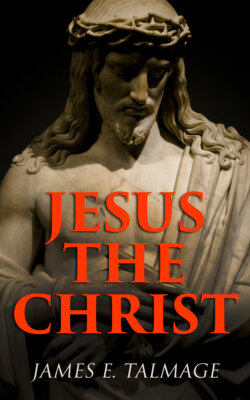Читать книгу Jesus the Christ - James E. Talmage - Страница 47
На сайте Литреса книга снята с продажи.
THE FIRST DISCIPLES OF JESUS.317
ОглавлениеTwo of the Baptist's followers, specifically called disciples, were with him when for the second time he expressly designated Jesus as the Lamb of God. These were Andrew and John; the latter came to be known in after years as the author of the fourth Gospel. The first is mentioned by name, while the narrator suppresses his own name as that of the second disciple. Andrew and John were so impressed by the Baptist's testimony that they immediately followed Jesus; and He, turning toward them asked: "What seek ye?" Possibly somewhat embarrassed by the question, or with a real desire to learn where He might be found later, they replied by another inquiry: "Rabbi, where dwellest thou?" Their use of the title Rabbi was a mark of honor and respect, to which Jesus did not demur. His courteous reply to their question assured them that their presence was no unwelcome intrusion. "Come and see," said He.318 The two young men accompanied Him, and remained with Him to learn more. Andrew, filled with wonder and joy over the interview so graciously accorded, and thrilled with the spirit of testimony that had been enkindled within his soul, hastened to seek his brother Simon, to whom he said: "We have found the Messias." He brought Simon to see and hear for himself; and Jesus, looking upon Andrew's brother, called him by name and added an appellation of distinction by which he was destined to be known throughout all later history: "Thou art Simon the son of Jona; thou shalt be called Cephas." The new name thus bestowed is the Aramaic or Syro-Chaldaic equivalent of the Greek "Petros," and of the present English "Peter," meaning "a stone."319
On the following day Jesus set out for Galilee, possibly accompanied by some or all of his newly-made disciples; and on the way He found a man named Philip, in whom He recognized another choice son of Israel. Unto Philip He said: "Follow me." It was customary with rabbis and other teachers of that time to strive for popularity, that many might be drawn to them to sit at their feet and be known as their disciples. Jesus, however, selected His own immediate associates; and, as He found them and discerned in them the spirits who, in their preexistent state had been chosen for the earthly mission of the apostleship, He summoned them. They were the servants; He was the Master.320
Philip soon found his friend Nathanael, to whom he testified that He of whom Moses and the prophets had written had at last been found; and that He was none other than Jesus of Nazareth. Nathanael, as his later history demonstrates, was a righteous man, earnest in his hope and expectation of the Messiah, yet seemingly imbued with the belief common throughout Jewry—that the Christ was to come in royal state as seemed befitting the Son of David. The mention of such a One coming from Nazareth, the reputed son of a humble carpenter, provoked wonder if not incredulity in the guileless mind of Nathanael, and he exclaimed: "Can there any good thing come out of Nazareth?" Philip's answer was a repetition of Christ's words to Andrew and John—"Come and see." Nathanael left his seat under the fig tree,321 where Philip had found him, and went to see for himself. As he approached, Jesus said: "Behold an Israelite indeed, in whom is no guile." Nathanael saw that Jesus could read his mind, and asked in surprize: "Whence knowest thou me?" In reply Jesus showed even greater powers of penetration and perception under conditions that made ordinary observation unlikely if not impossible: "Before that Philip called thee, when thou wast under the fig tree, I saw thee." Nathanael replied with conviction: "Rabbi, thou art the Son of God; thou art the King of Israel." Earnest as the man's testimony was, it rested mainly on his recognition of what he took to be a supernatural power in Jesus; our Lord assured him that he should see yet greater things: "And he saith unto him, Verily, verily, I say unto you, Hereafter ye shall see heaven open, and the angels of God ascending and descending upon the Son of man."
